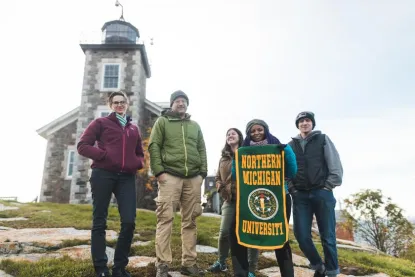
M.A. in English
The Master of Arts in English allows students to develop their critical thinking, textual analysis, writing, and teaching abilities in preparation for further graduate study and for work in diverse professional fields. All English MA students take courses in literary studies and critical theory; they also choose a concentration, which includes both coursework and a capstone project. We offer three concentrations: 1) Writing and Literacy Studies, 2) Literature and the Environment, and 3) Literature, as well as a graduate certificate in Teaching English to Speakers of Other Languages (TESOL).
We welcome international applicants! For guidance, please visit the International Graduate Admissions website or email ipo@nmu.edu.

Opportunities for M.A. Students
- graduate assistantships with tuition remission and an annual stipend
- teaching experience in composition, literature, and TESOL
- editorial fellowships with the nationally renowned scholarly journal Western American Literature
- internships at the nationally renowned literary journal Passages North
- writing center administration experience
- travel funding for academic and writing conferences
- summer research funding
- professional training seminars in teaching, writing, and publishing
- experiential learning in one of the country's most stunning landscapes
- lectures and readings with visiting scholars and writers
Program Concentrations
Writing and Literacy Studies
The WLS concentration includes courses in writing studies, rhetorical theory, pedagogy, linguistics, and teaching English to speakers of other languages (TESOL). Students in this concentration are often interested in teaching at the secondary or college level, teaching English as a second language, pursuing a PhD in rhetoric and composition, or entering fields that require advanced training in technical or professional writing.
Literature and the Environment
Our newest addition to the English MA program, the Literature and the Environment concentration includes courses in ecocriticism, environmental literature, and nature writing (many of which include outdoor experiences)--as well as courses in fields other than English, such as Business; Communication and Media Studies; Earth, Environmental, and Geographical Sciences; and Native American Studies. If you're interested in merging your love for literature with your concern for the environment--or in pursuing a "green career" in environmental communication, advocacy, or education--this could be the right concentration for you!
Literature
The Literature concentration includes courses in American, British, and world literature, as well as film studies and critical theory. Our faculty have expertise in literature from the early modern period to the present, Native American literature, African American literature, disability studies, the digital humanities, and more. Students in this concentration are often interested in teaching at the secondary or college level, pursuing a PhD in literature, or pursuing a career related to arts and culture.
Recent Courses
Fall 2023
- EN 502: Nonfiction Workshop
- EN 508: Seminar in Nature Writing / EN 525: Topics in Literature and the Environment: The Island Experience
- EN 509: Teaching Colloquium*
- EN 510: Writing and Literacy Studies: Theory and Practice
- EN 515: English Grammar & Usage
- EN 590: Seminar in British Literature: Gardens in Modern British Literature and Culture
*Required for all new teaching assistants
Summer 2023
- EN 505: Genres of Writing: Writing Adventures [online]
Current & Upcoming Courses
Winter 2024
- EN 504: Introduction to Critical Theory
- EN 505: Genres of Writing: Writing for Social Change
- EN 516: Second Language Acquisition
- EN 530: Major Authors: Toni Morrison
Fall 2024
- EN 506: Ecocriticism and Environmental Literature
- EN 509: Teaching Colloquium*
- EN 514: Seminar in the English Language
- EN 595: Battlefields of Memory: History, Memory, and Politics in Central European Cinema after 1945
*Required for all new teaching assistants
If you have additional questions, contact M.A. Program Director, Dr. Caroline Krzakowski.
